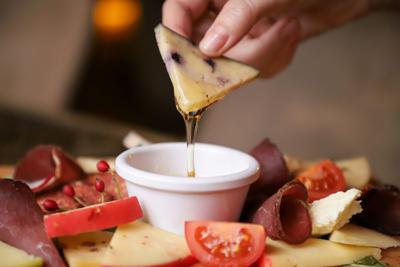
Aurela Redenica
By Stephen Beech
Cheese really can give people nightmares, according to new research.
Scientists have found that eating too much dairy can ruin sleep.
They say lactose intolerance may be linked to consuming dairy, bad dreams, and poor quality sleep.
Old wives' tales suggest that what we eat affects sleep patterns.
But, until now, there has been little evidence to prove or disprove the theory.
Canadian researchers surveyed 1,082 students at MacEwan University in Canada, for the new study.
The participants were asked about sleep time and quality, dreams and nightmares, and any perceived association between different kinds of dreams and different foods.
They were also questioned about their mental and physical well-being as well as their relationship with food.
The findings showed that around a third of the participants reported regular nightmares.
Women were more likely to remember their dreams and to report poor sleep and nightmares, and nearly twice as likely as men to report a food intolerance or allergy.
Around 40% of the participants said that they thought eating late at night or specific foods affected their sleep, while roughly one-in-four believed particular foods could make their sleep worse.
People who ate less healthily were more likely to have negative dreams and less likely to remember dreams, according to the findings published in the journal Frontiers in Psychology.
The research team found a "strong association" between nightmares and lactose intolerance, potentially because gas or stomach pain during the night affects people’s dreams.
Study lead author Dr. Tore Nielsen, of the University of Montreal, said: “Nightmare severity is robustly associated with lactose intolerance and other food allergies.
“These new findings imply that changing eating habits for people with some food sensitivities could alleviate nightmares.
"They could also explain why people so often blame dairy for bad dreams.
“We are routinely asked whether food affects dreaming, especially by journalists on food-centric holidays. Now we have some answers.”
Most participants who blamed their bad sleep on food believed sweets, spicy foods, or dairy were responsible.
Only a comparatively small proportion (5.5%) felt that what they ate affected the tone of their dreams.
But many of these participants said they thought sweets or dairy made their dreams more disturbing or bizarre.
When the research team compared reports of food intolerances to reports of bad dreams and poor sleep, they found that lactose intolerance was associated with gastrointestinal symptoms, nightmares, and low sleep quality.
The researchers believe it’s possible that eating dairy activates gastrointestinal disturbance, and the resulting discomfort affects people’s dreams and the quality of their rest.
Dr. Nielsen said, “Nightmares are worse for lactose-intolerant people who suffer severe gastrointestinal symptoms and whose sleep is disrupted.
“This makes sense, because we know that other bodily sensations can affect dreaming.
"Nightmares can be very disruptive, especially if they occur often, because they tend to awaken people from sleep in a dysphoric state.
"They might also produce sleep avoidance behaviours. Both symptoms can rob you of restful sleep.”
He said it could also explain why fewer participants reported a link between their food and their dreams than in a previous study he helped conduct 11 years earlier on a similar population.
Dr. Nielsen says improved awareness of food intolerances could mean that the students in the new study ate fewer foods likely to activate their intolerances and affect their sleep.
If this is the case, he said simple dietary interventions could potentially help people improve their sleep and overall health.
But, besides the robust link between lactose intolerance and nightmares, it’s not clear how the relationship between sleep and diet works.
The researchers believe it’s possible that people sleep less well because they eat less well, but it’s also possible that people don’t eat well because they don’t sleep well, or that another factor influences both sleep and diet.
Dr. Nielsen says more research will be needed to confirm the links and identify the underlying mechanisms.
He added: “We need to study more people of different ages, from different walks of life, and with different dietary habits to determine if our results are truly generalisable to the larger population.
“Experimental studies are also needed to determine if people can truly detect the effects of specific foods on dreams.
"We would like to run a study in which we ask people to ingest cheese products versus some control food before sleep to see if this alters their sleep or dreams.”








(0) comments
Welcome to the discussion.
Log In
Keep it Clean. Please avoid obscene, vulgar, lewd, racist or sexually-oriented language.
PLEASE TURN OFF YOUR CAPS LOCK.
Don't Threaten. Threats of harming another person will not be tolerated.
Be Truthful. Don't knowingly lie about anyone or anything.
Be Nice. No racism, sexism or any sort of -ism that is degrading to another person.
Be Proactive. Use the 'Report' link on each comment to let us know of abusive posts.
Share with Us. We'd love to hear eyewitness accounts, the history behind an article.